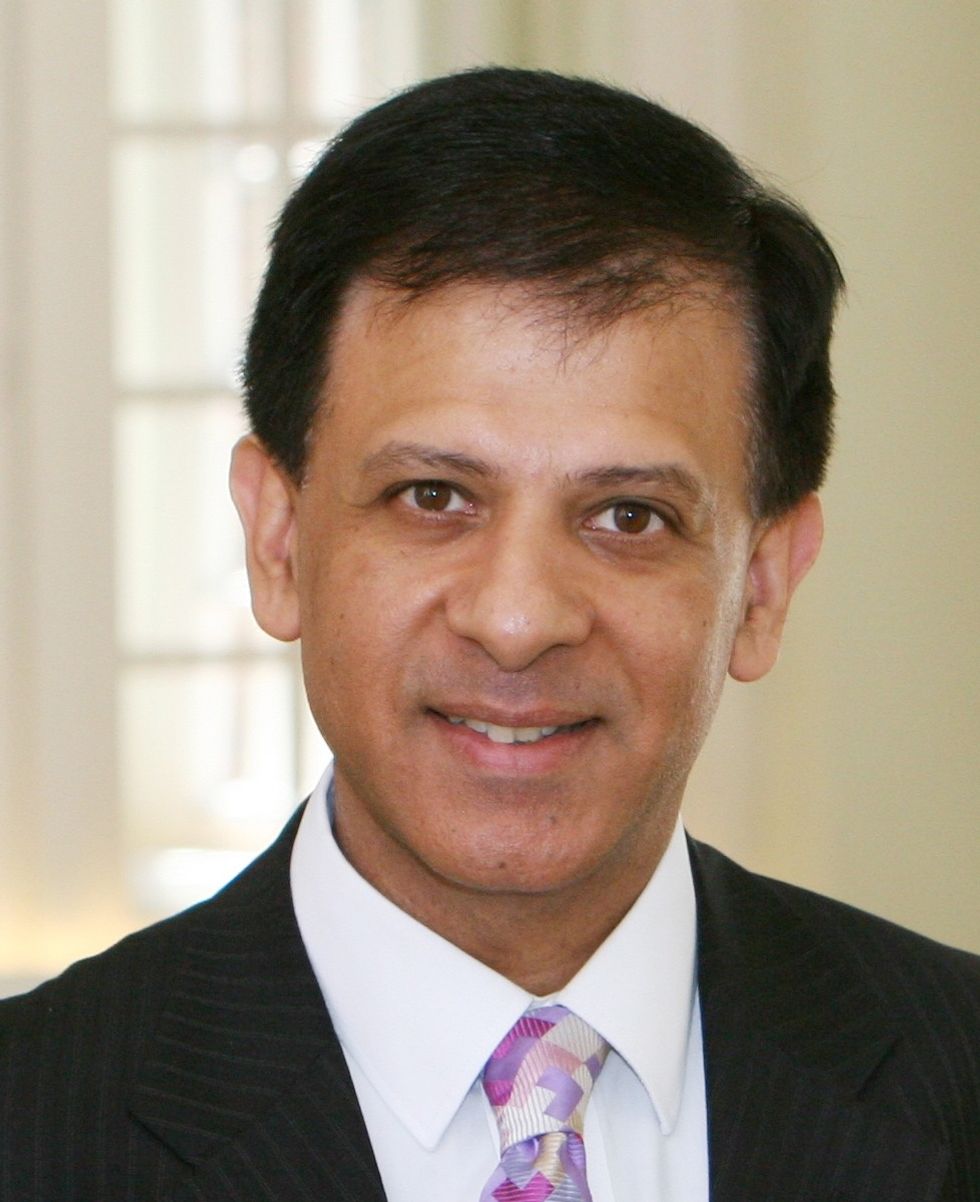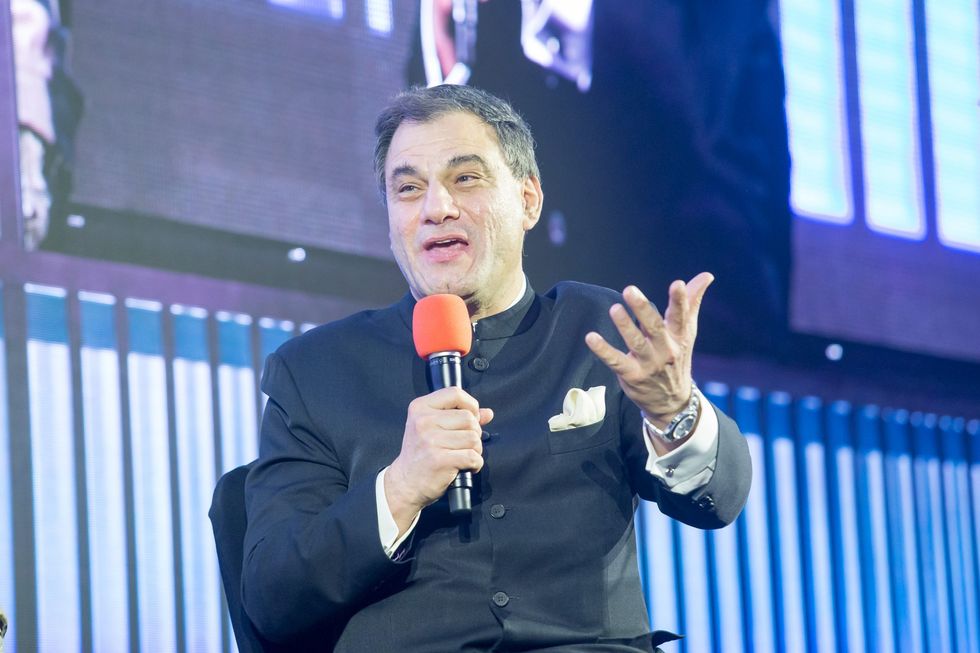AN INFLUENTIAL doctors’ leader has raised concerns about the pressure GPs are likely to face as the imminent cost of living crisis bites, while a leading business figure said higher taxes will stifle economic recovery as he also urged ministers to continue free lateral flow tests beyond March.
Dr Chaand Nagpaul, the chair of the British Medical Association council, and Lord Karan Bilimoria, president of the Confederation of British Industry (CBI), told Eastern Eye the economy and healthcare sector were braced for the impact of higher taxes from April.
Nagpaul warned of the “mismatch between record demand from patients, and a lack of healthcare workers to deliver that care”.
In an interview with Eastern Eye on Monday (21), ahead of the chancellor’s Spring statement on Wednesday (23), Nagpaul noted that more than six million patients were waiting for treatment, in addition to about 10 or 20 million people who were in the queue for outpatient services.
“The crisis facing the NHS is twofold. One, it has the greatest backlog of care ever witnessed. And on top of that, we have a workforce crisis, where we have over 100 vacancies in NHS hospitals, and about 8,000 doctor vacancies,” Nagpaul said.
In a separate conversation, Bilimoria explained why higher taxes would hit growth and investment, particularly after the impact of the lockdowns on businesses during the past two years.

“There’s inflation being suffered by businesses, and by consumers. Inflation is now predicted to go up to eight per cent. Taxes are going up, interest rates are going up. We’re being squeezed between a rock and a hard place; energy prices are going up as well. It’s a very fragile recovery. This is the worst time to be putting up taxes,” he told Eastern Eye.
He also cautioned it would be “pennywise and pound foolish to withdraw the (free of charge) lateral flow tests (LFT) at this stage”.
While big businesses would pay for tests for their employees, ordinary Britons could likely be put off paying £20 for a pack of seven LFT tests even if they suspect they have the virus, Bilimoria said.
He noted how the vaccination programme, with booster shots, free of charge testing and anti-viral treatments had all helped put Britain on its path out of the pandemic.
However, Bilimoria stressed that “in the short run, we feel that these tests should be available to business and individuals, for the foreseeable future, and not just stopped at the end of March”.
Last Thursday (17), Nagpaul sent a letter to chancellor Rishi Sunak seeking support for the NHS and healthcare workers. He said there was an estimated shortage of 46,000 doctors and noted the impact of burnout on medical professionals, while also urging an expansion of medical school places by up to 11,000 students per annum on average over the next three years.
Dr Nagpaul told Eastern Eye, “You cannot separate the socio-economic determinants of health from illness – the two are interlinked.
“One thing we learned from the pandemic is that people from deprived backgrounds were twice as likely to die from Covid (as those from privileged groups). And we also saw the disproportionate numbers of certain ethnic groups, like Bangladeshis, living in overcrowded environments, and the impact that had.
“When you have situations like increases in poverty, greater levels of financial hardship, they do impact on the health of individuals. And those communities most disadvantaged by financial pressures or deprivation will be the [ones] most needing the health service.
“At a time when the health service is already struggling with demand, it does worry me how we’ll be able to manage those sort of levels of care and demand placed upon us in the community, especially among GPs.”
Sunak is expected on Wednesday to announce further plans to support people with the rising cost of living, as the chancellor pledged to continue to “stand by” hard-working, low-income families who experts warn may have to choose between paying heating bills and food.
Last Sunday (20), he said he would help where he could with a cost-of-living squeeze, but warned that the Ukraine crisis and sanctions on Russia would add to the economy’s problems.
Asked by the BBC last Sunday if he planned to step in and help households with their energy bills, Sunak said, “Of course, I am, and people can judge me by my actions over the past two years where we’ve been able to make a difference.”
But he said the government could not solve every problem. “I wish I could, but I can’t, especially when you’re dealing with global inflationary forces that are at play.”
In his two-page letter to the chancellor, Nagpaul called for a £1billion welfare and wellbeing fund for healthcare staff.
He told Eastern Eye, “For all healthcare workers, the past two years have probably been the most physically and emotionally challenging in their professional lives. Doctors have seen illness and death at the kind of levels they have never experienced before.
“But what’s been particularly traumatic for healthcare workers from ethnic minorities – especially in the first few months of the pandemic – is that the toll of illness and death has been disproportionate for many ethnic minorities.
“I speak on behalf of doctors and the first 10 doctors who died of Covid – they were all from an ethnic minority. It was something I called out in early April (2020). And we demanded that the government review that.
“We now have 84 per cent of all doctors who have died coming from ethnic minorities. We’ve again got similarly disproportionate figures for ethnic minority nurses, care workers, and those doing key roles throughout the pandemic.
“Now, we are in a stage of the pandemic when the levels of serious illness have dropped because of the vaccination programme. But, actually, for many of those ethnic minority doctors, the issue around the pain and trauma of the first few months is still remaining. And we have lost many of our colleagues.”
In the past two years, Eastern Eye has reported on the pressures facing ethnic minority healthcare professionals and key workers who were on the frontline of the pandemic, highlighting the lack of PPE and their experiences of racism at a time when the Covid-19 vaccines were still being developed.
Nagpaul said the pandemic exacerbated historic inequalities in the way that doctors of different backgrounds were treated. While these existed previously, the past two years showed that the pandemic cost “many their health and in some cases, their lives”, he said.
“When we asked doctors, ‘why did you not speak up?’ they said they were afraid, because they thought it would affect their career progression, or that there would be some adverse consequences.
“During the pandemic, they were suffering bullying and harassment at higher levels than before. In the first wave, they felt two to three times more pressure to see patients without adequate PPE.”

According to the BMA council chair, doctors are often not as willing or able to speak about their own pressures, burnout and their own mental health. “During the pandemic, we’ve seen a significant increase in worsening of mental health of doctors, generally,” he said.
“And for ethnic minority doctors, they have reported greater levels of stress in terms of issues of fear of not being protected in the first phase of the pandemic; continued concerns that they’ve not been treated equally; and that if something goes wrong, they feel they’re more likely to be blamed.”
He added, “Doctors are also physically exhausted. During the pandemic they were often redeployed in different roles – ENT doctors having to work in critical care, for example.
“And when visitors were not allowed to see their loved ones in hospitals, doctors had to be the conduit between a patient and their family members, by holding a smartphone. These experiences, I believe, will linger, and will be imprinted in the minds of many health workers forever.
“There is a concern that for some, there’ll be an element of post-traumatic stress disorder (PTSD). Many, I believe, have kept a lot of their mental anguish to one side, but actually they are suffering. We will, in the coming months, have to address that.”
Last Wednesday (16) the BMA unveiled a memorial sculpture at a service for doctors who died while caring for Covid patients (see facing page), two years after the first lockdown was imposed in the UK.
Reflecting on the past 24 months, Nagpaul said one of the positive outcomes was the amalgam of medical research and science.
“We managed a collective global effort to develop vaccines in around 10 months, that normally will have taken up to 10 years to develop. That was a success.
“The other aspect is we have shown healthcare workers can adapt and work differently. We have been able to provide remote consultations and used digital technology in ways not done previously, such as with pulse oximetry. It has been around for a long time, but before the pandemic, we weren’t empowering patients to look at their own health in this way.”
In his letter to the chancellor, Nagpaul highlighted the link between the country’s health service and the economy. He said, “The total economic cost of lost output and health costs has been estimated at around £100bn a year”.
He told Eastern Eye, “We do need to extinguish a legacy that has basically highlighted that we have a health service, which on the one hand, prides itself in saying that it provides care on the basis of equality, equal need,and clinical need, but actually, in reality, is a health service where some people are disadvantaged in the care they receive.
“Those who work within the health service are also disadvantaged because of their background.
“That has to end – we have to now learn the lessons from this pandemic, and create a health service that provides equal opportunity, equal treatment for all those that work within it, and equal treatment based upon clinical needs.
“We have to make sure we have a health service underpinned by proper values of inclusivity, fairness and equality.”
Meanwhile Bilimoria praised British manufacturing and its universities, saying they were world-class.
“Every aspect of this country – our universities are the best in the world. Along with America, we’ve got phenomenal capabilities, we punch well above our weight,” he said.
“Just imagine how much more we could do if we had government-backed investment, that backed research and development (R&D) and innovation.
“If we put in one more per cent of our GDP in R&D and innovation, that extra £20bn a year will pay back many times over. We got to have the guts to power this wonderful country and economy ahead, not hinder it.”

















